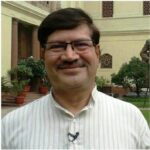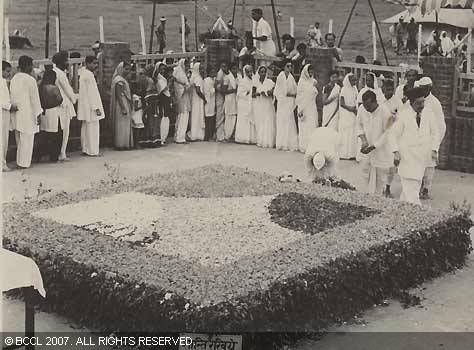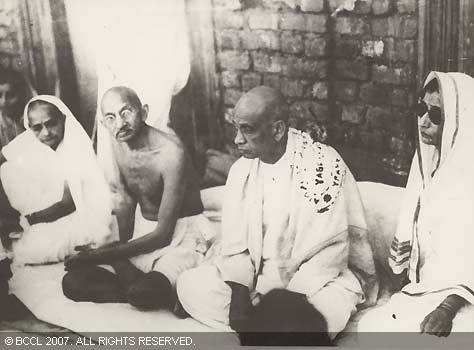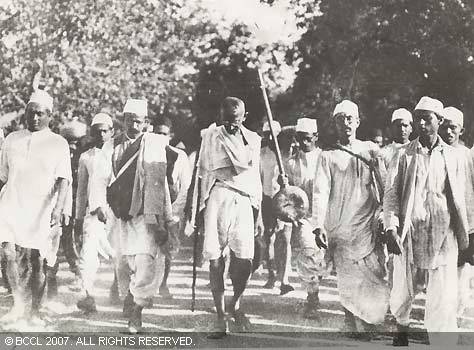
Gandhi, the Mahatama, was truly a citizen of the world though he worked for the freedom of the Indian nation from foreign yoke. Though a Brahmin by birth, humanity was his religion.
He believed that for victory, war was the most blunt weapon and the sharpest one was obviously non-violence. He abhorred the concept of might being the right.
The obiter dictum of Gandhi, “Most religious men I have met, are politicians in disguise. I, however, who wears the guise of a politician, am at heart, a religious man,” remains the key to the value system of the political philosophy that he adhered to.
What Gandhi, till he breathed his last, lamented, was that despite challenging irreligion, he found that irreligion cemented its greatest stronghold in politics.
In fact Gandhi entered politics to fight irreligion. He also accepted the fact that he might not be absolutely accurate as regards his words used —hallmark of a true great.
“My religion has no geographical boundaries,” he explained to Kakasaheb Kalekar once. “If I have a living faith in it, it will transcend my love for India herself,” said Gandhi. It was that brand of religion that taught us to believe absolutely in the soul and rely solely on soul force for fighting all the ills in human hearts or in human society.
Truth for Gandhi was God. And non-violence or soul force, his only means of fighting the ills of life. He was not a nationalist in the narrow parochial sense in which the word is used.
Gandhi was at pains to explain to the American writer Jeanette Eaton that his nationalism in reality was intense internationalism. “Our nationalism can be no peril to other nations inasmuch as we will exploit none, just as we allow none to exploit us.”

In her Gandhi: Fighter Without A Sword, Eaton narrates that the greatest influence of Gandhi on her was Gandhi’s notions on oneness of the world.
Gandhi told C.R. Das once: How heartening it is to imagine that when there is One World and no militarised boundaries and all the natural and human resources, all the sciences and technology which are today marshalled and arrayed for destructive purposes, will be used for the elimination of poverty, ill-health and ignorance.
They shall be used for promoting goodwill and for creating better conditions of life for the whole of humanity. Though this rosy picture is today the privilege only of the poets and the utopian dream of idealists, there is no doubt that this is the cherished hope of everyone who strives for harmony.
Maulana Abul Kalam Azad in his India Wins Freedom states that Gandhiji is universally acknowledged as the greatest man of his age simply for the reason that despite affecting the destiny of the whole sub-continent, he held no high office nor was he a statesman ruling the destinies of countries.
Nevertheless, Azad was also disillusioned with Gandhi as he had promised him that no possibility of Partition was there and if at all, the Partition would take place, it would take place on his dead body. Azad also suggested that in the long run, it would be better, if Sardar Patel was given the responsibility of becoming the first Prime Minister of free India.

As Gandhi too thought that to be sensible but owing to being almost impossible to come out of the clutches of Nehru, he couldn’t carry it out. Had it happened, India would have been leading the world!
By sacrificing political gains, he bought peace like all true thinkers and philosophers. He was above all the frivolities of political life as he drew his strength from what he termed “soul force”, an inner strength that comes only when one believes in non-violence, truth and an abiding faith in the innate goodness lurking in all fellow beings. It was this quality of Gandhi that made him a leader of the world leaders.
Gandhi had the courage of a statesman for initiating reforms. However, he did not live long enough to see his ideas implemented as the life of this saint who advocated non-violence, was cut short by most horrendous and heinous act of violence.
Duty to Gandhi was of paramount importance. He said, “Duties to self, to the family, to the country and to the world are not independent of one another. One cannot do good to the country by injuring the world at large.
In the final analysis, we must die so that the family may live, the family must die so that the country may live and the country must die so that the world may live. Therefore, self-purification is the first step. When the heart is pure, we at once realize what our duty is at every moment.”
In fact this was ingrained in his mind right from his childhood when he learnt the ancient aphorism : Ayam nij paro veti gannnana laghu chetsam/ Udar charitanam tu vasudhaiva kutumbakam. (Only men of little minds make a distinction saying, “This one is my kinsman, the other is a stranger.”/ To the large-hearted ones, the whole world is but a compact family).
For an Undivided India, Gandhiji shared his dreams with Pandit Nehru, Maulana Azad and Sardar Patel. In the Partition plan he could see the seeds of Indian Balkanization.
Tagore had believed that Gandhi would fail—like all saints who had also failed. Wrote Tagore, “Perhaps he will not succeed. Perhaps he will fail as the Buddha failed, as Christ failed and as Lord Mahavira failed to wean men from their inequities, but he will be remembered as one who made his life an example for all ages to come.
Will Durant, in an article in The Manchester Guardian wrote, “Perhaps Gandhi failed as saints are likely to fail in this very hostile, selfish and Darwinian world. But these very failures are the eternal successes attained by saintly people as they can never stoop to the detestable levels of this materialistic world in which each one is running after the god of Mammon.”
The teachings of Gandhi still relevant today, will remain for posterity and his wider significance to a world torn with violence may yet await their fulfilment.
—————————————————————————————————————–FIROZ BAKHT AHMED, A-202 Adeeba Market and Apartments, Near Rehmani Masjid, Main Road, Zakir Nagar, New Delhi 110 025. Ph.: 26983211, 26984517, 98109-33050 E-mail: firozbakhtahmed08@gmail.com
(The author is the grandnephew of Bharat Ratna Maulana Azad and chancellor, MANUU, Hyderabad).

